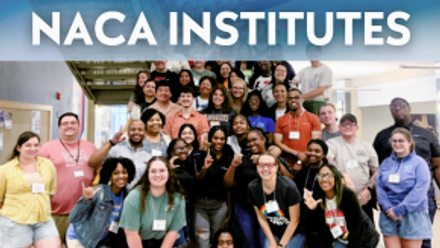Student Involvement and Its Connection to College Graduation
We know college is more than the academic journey; it's a time of self-discovery, growth, and building lasting connections. One of the most significant factors that can influence a student's success is their involvement in Campus Activities. NACA defines Campus Activities as beyond-the-classroom experiences that intentionally connect, engage, and develop a college community where everyone belongs. Student involvement goes beyond attending classes—it includes participating in organizations, intramurals, student government, the programming board, and other beyond-the classroom activities. Students who engage in Campus Activities are more likely to graduate and thrive in their professional lives, due to the many benefits involvement offers.
Building a Sense of Belonging
A significant outcome of student involvement is that it helps students feel connected to their campus community. When students join clubs or organizations, they meet peers with similar interests, which fosters a sense of belonging. This connection is particularly important as we consider the long tail of the pandemic and its impact on student loneliness. Current students have expressed a level of isolation higher than prior years. Feeling like a part of the community can motivate students to remain a part of the college experience and persist through challenges.
Developing Essential Life Skills
Participation in beyond-the-classroom activities is an opportunity for students to develop essential life skills - leadership, time management, teamwork, and communication. These skills are not only valuable in the classroom, but also in the workforce. Employers often seek graduates who can demonstrate these competencies, making student involvement a key factor in preparing for life after college. The Employability Skills Assessment and Student Leadership Competencies can help students convey these obtained skills on their resume or in professional conversations.
Enhancing Academic Performance
Contrary to the belief that beyond-the-classroom activities might detract from academic performance, many studies suggest the opposite. Involvement in campus activities often develops better time management and discipline, leading to improved academic performance. Engaged students are also more likely to utilize academic resources, seek help when needed, and stay motivated to achieve their academic goals. A July 2023 report from Tyton Partners found 60% of students were unaware of the vast amount of student support services offered at their college or university.
Creating Networking Opportunities
Involvement in student organizations and campus events provides opportunities for networking. Whether it’s connecting with fellow students, faculty, or desired industry professionals, these relationships can be instrumental in a student’s career development. Networking through campus involvement can lead to internships, job opportunities, and mentorships that enhance a student’s educational experience and future career prospects.
The connection between student involvement and graduation rates is well-documented. Students engaged within their college community are more likely to stay enrolled and complete their degrees. This is partly because involvement fosters a deeper commitment to their educational goals and creates a support system that can help them navigate the challenges of college life. Institutions that promote student engagement often see higher retention and graduation rates, as engaged students are more likely to feel satisfied with their college experience and persist to graduation.
Student involvement is a vital component of a vibrant college experience. It enriches students’ academic journeys, equips them with essential skills, and strengthens their connection to the campus community. By fostering student involvement and championing Campus Activities, colleges can help ensure that more students not only graduate but do so with the confidence and skills needed to succeed in their future careers. Therefore, encouraging and supporting student involvement should be a priority for educational institutions aiming to boost graduation rates and student success.






